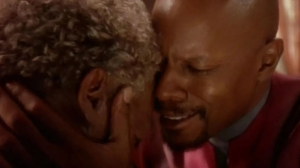
Muhammad Ali, one of the most famous athletes in American history, has passed away. He was 74.
Videos by ComicBook.com
The boxing legend was admitted to a Phoenix-area hospital earlier this weekend suffering from respiratory distress. While a family spokesman said that he was in fair condition, rumors immediately started to swirl that Ali’s condition was far worse than they let on.
Ali, born Cassius Clay, first started training at age 12 and won his first championship at age 22 in a stunning 1964 upset over Sonny Liston. At 18, he had won the Light Heavyweight gold medal in the 1960 Summer Olympics in Rome.
Shortly after his win over Liston, Clay joined the Nation of Islam and changed his name to Muhammad Ali. In 1967, he refused to serve in Vietnam citing religious objections; after he was convicted of draft evasion, he was stripped of his title.
“Why should they ask me to put on a uniform and go 10,000 miles from home and drop bombs and bullets on brown people in Vietnam while so-called Negro people in Louisville are treated like dogs?,” Ali said. “No I’m not going 10,000 miles from home to help murder and burn another poor nation simply to continue the domination of white slave masters of the darker people the world over. This is the day when such evils must come to an end. I have been warned that to take such a stand would cost me millions of dollars.”
It likely did; Ali wouldn’t fight again until 1971, when the conviction was overturned. The experience, along with other political and racial commentary from Ali, would make him as famous a cultural and political figure outside of the ring as he was an athlete inside of it.
Ali would go on to become the only heavyweight ever to win the title on three separate occasions: in 1964 against Liston, in 1974, and again in 1978.
A number of Ali’s fights, including the 1964 and 1974 championship wins, have gone down as some of the greatest matches in boxing history. By 1974, his “Rumble in the Jungle” saw then-champion George Foreman as a heavy favorite, with an aging Ali not expected to hold his own against Foreman, who had just defeated Joe Frazier for the title. Ali, for his part, had split two matches with Frazier, losing the first and winning the second, before he defeated Foreman in a title bout in Zaire.
After that victory, Ali agreed to a third match against Frazier, dubbed the “Thrilla in Manila” (again, a nod to the bout’s location). Ali won that match by TKO when Frazier’s trainer refused to allow him to enter the ring for the fifteenth round. What had been a competitive match for most of the night had turned into a beating when Frazier’s eyesight suffered as a result of facial swelling in the 12th, 13th, and 14th rounds. After that match Ali, who had typically been exceedingly cruel toward Frazier in pre- and post-fight trash talk, praised his rival’s skills.
Ali would go on to fight for another five years or so, in largely unmemorable fights. He lost to Leon Spinks in 1978, then defeated Spinks to retake the title in their next match. Ali would retire in July of 1979, but come back for two more humiliating fights — losses against Larry Holmes — the only time Ali ever lost by knockout — and Trevor Berbick.
Before the Holmes fight, Ali had started to suffer slurred speech and shaking in his extremities — early signs of Parkinson’s Disease. He would be formally diagnosed in 1984.
Ali’s celebrity and acclaim allowed him to continue on in the public eye in spite of retiring from boxing. He was a guest referee at the first WrestleMania, met with Saddam Hussein during the first Gulf War to negotiate for the return of American hostages, participated in the post-9/11 America: A Tribute to Heroes concert fundraiser, and had ceremonial roles in the 1996 and 2012 Olympic Games.
Since 2013, Ali has been largely out of the public eye, and has been in and out of the hospital numerous times.
In addition to his legendary career and huge public persona, Ali has helped shape American popular culture. His much-discussed trash talk included phrases like “Float like a butterfly, sting like a bee.” An award-winning film about his life was made in 2001 and helped cement Will Smith as a box office juggernaut. Even one of his more forgettable fights — a 1975 bout against Chuck “The Bleeder” Wepner — was reportedly the inspiration for the film Rocky.








